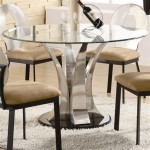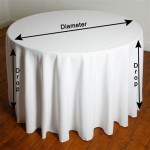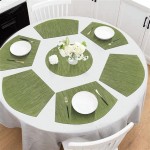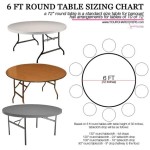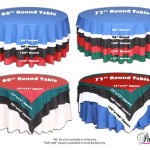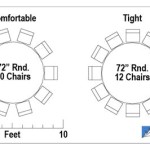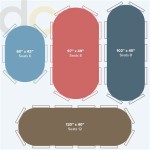Are Round Tables Better Than Rectangular Tables? Exploring Essential Aspects
When deciding on a table for your home, office, or event space, one of the primary considerations is its shape. Round and rectangular tables offer distinct advantages and disadvantages, making it essential to evaluate their features before making a choice. This article will delve into the essential aspects of round tables and rectangular tables to help you determine which shape is the most suitable for your specific needs and preferences.
Shape and Space Utilization
Round tables have a circular shape, which eliminates any sharp corners or edges. This can be an advantage in smaller spaces, as it allows for more efficient use of the available area. Round tables can be placed in the center of a room without obstructing the flow of traffic. Rectangular tables, on the other hand, have straight sides and right angles, which means they can take up more space and may not be as well-suited for smaller areas.
Seating Arrangements
The shape of a table also influences the seating arrangements possible. Round tables promote a more intimate and inclusive atmosphere, as all participants are equidistant from each other. They are ideal for group discussions, brainstorming sessions, and other collaborative activities. Rectangular tables, on the other hand, offer a more formal and structured seating arrangement, with participants sitting in rows facing each other. This can be beneficial for meetings, presentations, and other situations where hierarchy or order is important.
Aesthetics and Style
The shape of a table can also affect its aesthetic appeal and style. Round tables are often considered more elegant and sophisticated, creating a warm and inviting ambiance. They can be paired with various chair styles and complement both traditional and modern interiors. Rectangular tables are often associated with a more modern and functional aesthetic. They can add a sense of order and structure to a space and are well-suited for minimalist or contemporary designs.
Functionality and Versatility
Round tables are typically less versatile than rectangular tables when it comes to functionality. Due to their circular shape, they may not be as suitable for activities that require additional space, such as spreading out documents or setting up equipment. Rectangular tables, with their ample surface area and straight edges, offer more flexibility for these types of activities.
Overall Considerations
When deciding between a round table and a rectangular table, it is important to consider the following factors:
- Space availability: Round tables are better suited for smaller spaces, while rectangular tables may be better for larger spaces.
- Seating arrangements: Round tables promote a more inclusive atmosphere, while rectangular tables offer a more formal arrangement.
- Style preferences: Round tables are often considered more elegant, while rectangular tables are more modern and functional.
- Functionality: Rectangular tables offer more flexibility for activities that require additional space.
Ultimately, the best choice for you will depend on your specific needs, preferences, and the context in which you will be using the table. By carefully considering the essential aspects discussed in this article, you can make an informed decision that will enhance the functionality, aesthetics, and overall ambiance of your space.

Rectangle Vs Round Dining Tables Living With Style

Round Vs Rectangular Dining Tables How To Choose The Best For Your Space
What Are The Advantages Of A Round Table Over Rectangular Or Square Quora

The Best Dining Table Shapes Castlery Singapore

Blog House Of Oak
Round Vs Rectangular Dining Tables Which Is Better For You Cuura Space

Choosing The Best Table Style Kaplan Early Learning Company

How To Choose The Right Dining Table For Your Home New York Times

Round Vs Rectangular Dining Table Maid2match

Round Vs Rectangular Dining Tables Which Is Better For You Cuura Space
Related Posts

